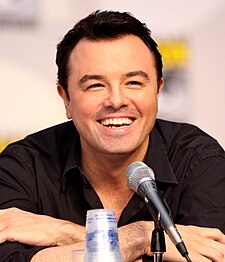The Television Portal

Television (TV) is a telecommunication medium for transmitting moving images and sound. The term can refer to a television set, or the medium of television transmission. Television is a mass medium for advertising, entertainment, news, and sports.
Television became available in crude experimental forms in the 1920s, but only after several years of further development was the new technology marketed to consumers. After World War II, an improved form of black-and-white television broadcasting became popular in the United Kingdom and the United States, and television sets became commonplace in homes, businesses, and institutions. During the 1950s, television was the primary medium for influencing public opinion. In the mid-1960s, color broadcasting was introduced in the U.S. and most other developed countries.
In 2013, 79% of the world's households owned a television set. The replacement of earlier cathode-ray tube (CRT) screen displays with compact, energy-efficient, flat-panel alternative technologies such as LCDs (both fluorescent-backlit and LED), OLED displays, and plasma displays was a hardware revolution that began with computer monitors in the late 1990s. Most television sets sold in the 2000s were flat-panel, mainly LEDs. Major manufacturers announced the discontinuation of CRT, Digital Light Processing (DLP), plasma, and even fluorescent-backlit LCDs by the mid-2010s. LEDs are being gradually replaced by OLEDs. Also, major manufacturers have started increasingly producing smart TVs in the mid-2010s. Smart TVs with integrated Internet and Web 2.0 functions became the dominant form of television by the late 2010s. (Full article...)
Selected article -
Selected image -

The Kaknäs tower (Swedish: Kaknästornet) is a TV tower in Gärdet in Stockholm, Sweden. It has 72 pillars. The tower is a major hub of Swedish television, radio and satellite broadcasts. It was finished in 1967, designed by architect Bengt Lindroos, and the height is 155 metres (509 ft) or 170 metres (560 ft) with the antenna included. The tower is owned by the national Swedish broadcasting company Teracom. The tower's name comes from the ancient name of the area, Kaknäs.
Did you know (auto-generated) -

- ... that a Ramadan television show featured riddles, music, choreographed dance routines and "fantastical narratives"?
- ... that Dallas television station KDAF abandoned plans to launch a local newscast in 1994, after having already hired 20 staff, because it was to lose its Fox affiliation and be sold?
- ... that a television in the film Day of Reckoning includes scenes from Big Ass Spider!?
- ... that the 2017 acquisition of Katz Broadcasting by the E. W. Scripps Company was seen as a validation of the business of diginets?
- ... that the 1999 video game Interplay Sports Baseball Edition 2000 used a public-address announcer while its rivals were switching to two commentators as featured on real MLB game broadcasts?
- ... that Digital pulled their HiNote Ultra laptop out of a manila envelope on television nearly 15 years before Apple did the same?
Selected quote -
More did you know
- ...that the Simpsons short Good Night aired April 19, 1987 on The Tracey Ullman Show and was the first ever appearance of the Simpson family on television?
- ...that the 1994 Guinness television advertisement Anticipation used jump cutting techniques to make an actor appear to be performing a physically impossible dance?
- ...that an advertising spot immediately following Xinwen Lianbo, a daily news programme shown by most terrestrial television stations in mainland China, can sell for an estimated US$100,000?
- ...that Melbourne rock band The Strangers appeared on weekly television for nine years straight?
- ...that Judy Morris, co-writer of the Academy Award winning Happy Feet has also acted in many of the most popular North American and Australian television programs since the age of 10?
Selected biography -
Pierino Ronald "Perry" Como (/ˈkoʊmoʊ/; May 18, 1912 – May 12, 2001) was an American singer, actor, and television personality. During a career spanning more than half a century, he recorded exclusively for RCA Victor for 44 years, from 1943 until 1987.
"Mr. C.", as he was nicknamed, reportedly sold over 100 million records worldwide and pioneered a weekly musical variety television show. His weekly television shows and seasonal specials were broadcast throughout the world. He recorded primarily vocal pop and was renowned for recordings in the intimate, easy-listening genre pioneered by multimedia star Bing Crosby. In the official RCA Records Billboard magazine memorial, his life was summed up in these few words: "50 years of music and a life well lived. An example to all." (Full article...)General images
In the first series, the main plot involves a love triangle between surgical registrar Dr. Caroline Todd (Greig), anaesthetist Dr. Guy Secretan (Mangan), and surgeon Dr. "Mac" Macartney (Rhind-Tutt) and the affair between consultant radiologist Dr. Alan Statham (Mark Heap) who is in love with Joanna Clore (Pippa Haywood), the director of human resources. (Full article...)
News
- December 28: US professional wrestler Jon Huber dies aged 41
- September 2: Tributes paid to recently deceased US actor Chadwick Boseman
- May 24: Japanese professional wrestler and Netflix star Hana Kimura dies aged 22
- January 16: BBC newsreader Alagiah to undergo treatment for bowel cancer
- Upcoming events
Featured content
Main topics
History of television: Early television stations • Geographical usage of television • Golden Age of Television • List of experimental television stations • List of years in television • Mechanical television • Social aspects of television • Television systems before 1940 • Timeline of the introduction of television in countries • Timeline of the introduction of color television in countries
Inventors and pioneers: John Logie Baird • Alan Blumlein • Walter Bruch • Alan Archibald Campbell-Swinton • Allen B. DuMont • Philo Taylor Farnsworth • Charles Francis Jenkins • Boris Grabovsky • Paul Gottlieb Nipkow • Constantin Perskyi • Boris Rosing • David Sarnoff • Kálmán Tihanyi • Vladimir Zworykin
Technology: Comparison of display technology • Digital television • Liquid crystal display television • Large-screen television technology • Technology of television
Terms: Broadcast television systems • Composite monitor • HDTV • Liquid crystal display television • PAL • Picture-in-picture • Pay-per-view • Plasma display • NICAM • NTSC • SECAM
Categories
WikiProjects

|
You are invited to participate in WikiProject Television, a WikiProject dedicated to developing and improving articles about Television. |
- Main projects
- Sub-projects
Television Stations • American animation • American television • Australian television • British TV • BBC • Canadian TV shows • Television Game Shows • ITC Entertainment Productions • Digimon • Buffyverse • Doctor Who • Degrassi • EastEnders • Episode coverage • Firefly • Futurama • Grey's Anatomy • Indian television • Lost • Nickelodeon • The O.C. • Professional Wrestling • Reality TV • The Simpsons • Seinfeld • South Park • Stargate • Star Trek • Star Wars • Soap operas • Avatar: The Last Airbender • House
- Related projects
Animation • Anime and manga • Comedy • Comics • Fictional characters • Film • Media franchises
What are WikiProjects?
Things you can do

- Place the {{WikiProject Television}} project banner on the talk pages of all articles within the scope of the project.
- Write: Possible Possum
- Cleanup: color television, Alien Nation: Body and Soul, The Sopranos, Alien Nation: Dark Horizon, Alien Nation: The Enemy Within, Alien Nation: Millennium, Aang
- Expand: Timeline of the introduction of color television in countries
- Stubs: Flow (television), Just for Kicks (TV series), Play of the Month, Nova (Dutch TV series), More stubs...
Subportals
Related portals
Associated Wikimedia
The following Wikimedia Foundation sister projects provide more on this subject:
-
Commons
Free media repository -
Wikibooks
Free textbooks and manuals -
Wikidata
Free knowledge base -
Wikinews
Free-content news -
Wikiquote
Collection of quotations -
Wikisource
Free-content library -
Wikiversity
Free learning tools -
Wiktionary
Dictionary and thesaurus





























































